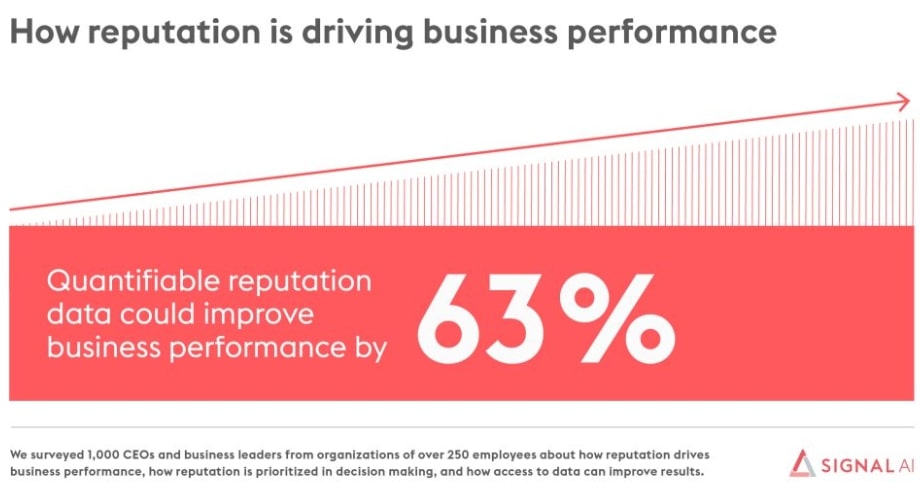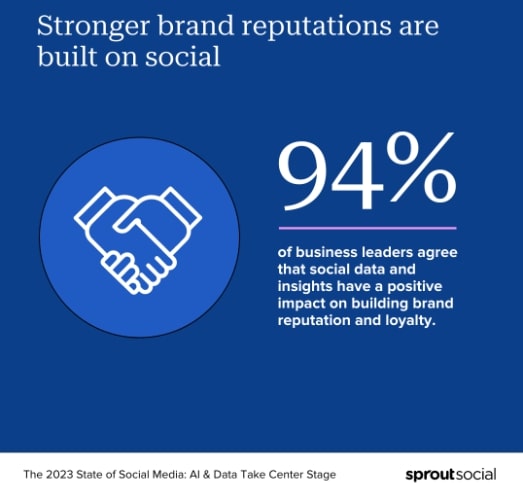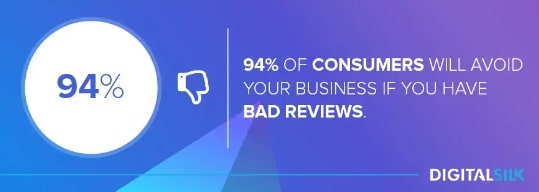As businesses increasingly find their success intertwined with their online image, reputation score have become a pivotal metric that can make or break a brand.
These scores are not merely arbitrary numbers but reflections of a company’s digital interactions, customer sentiments, and overall impact on the online ecosystem.
Understanding and handling these scores is crucial for businesses aiming to succeed in a world where trust and credibility matter not only in the real world but also in the virtual one.
This guide is here to help businesses make sense of reputation scores, offering a simple roadmap to navigate the complexities, avoid common pitfalls, and seize opportunities in the modern market.
Understanding Reputation Scores
In the digital age, a business’s reputation is encapsulated in a numerical representation known as a reputation score. This score serves as a condensed measure of how a company is perceived by its audience in the online realm.
Businesses must comprehend the factors that contribute to this score, as it plays a pivotal role in shaping consumer trust, brand loyalty, and overall success in the competitive marketplace.

Definition and Components
A reputation score is a numerical representation of a business’s overall standing in the eyes of its customers and stakeholders. It is derived from an analysis of multiple factors that contribute to the perception of the business.
Customer Reviews and Ratings
Opinions and feedback from customers play a pivotal role. Positive reviews and high ratings contribute positively, while negative reviews can have adverse effects.
Social Media Presence
The level of engagement and the quality of content on social media platforms influence reputation scores. Active, positive engagement enhances scores.
Online Mentions and Citations
Being cited or mentioned in online spaces, particularly by reputable sources, contributes positively to a business’s reputation.
Customer Complaints and Resolution
How a business handles complaints and resolves issues is a critical component. Swift and effective resolutions can mitigate negative impacts.
How Reputation Scores are Calculated
Reputation scores are calculated using sophisticated algorithms and data analysis.
Automated systems crawl through various online platforms, collecting data related to reviews, social media interactions, and mentions.
Each component is assigned a weight based on its perceived impact on the overall reputation. For example, customer reviews might carry more weight than social media engagement, depending on the industry and business model.
The Impact of Reputation Score on Businesses
Reputation scores wield significant influence in the contemporary business landscape, shaping customer perceptions and impacting various facets of a company’s operations.

Here’s how reputation scores exert significant impacts on businesses, shaping their overall performance and outcomes in various ways.
Customer Trust and Loyalty
Reputation scores are a key factor in establishing and maintaining trust with customers. Positive scores signal reliability, quality, and integrity, fostering trust in the brand.
High reputation scores contribute to customer loyalty. Satisfied customers are more likely to remain loyal, make repeat purchases, and recommend the brand to others.
Brand Image and Perceptions
A strong reputation score contributes to a positive brand image. Customers associate high scores with a company’s commitment to quality, customer satisfaction, and ethical business practices.
A positive score can elevate a brand in the eyes of potential customers, while a negative score may deter them from engaging with the business.
Revenue and Sales
A positive reputation can influence purchasing decisions, leading to increased sales and revenue. In competitive markets, businesses with higher reputation scores often enjoy more trust from consumers, translating into a competitive edge and enhanced revenue generation.
Competitive Advantage
Reputation scores serve as a differentiator in a crowded marketplace. Businesses with strong scores stand out, attracting customers who prioritize positive experiences and reliable products/services.
Positive reputation scores extend beyond customer interactions. They also make a company more appealing to potential employees, contributing to the recruitment and retention of top talent.
Crisis Management
Businesses with high reputation score are often more resilient to negative events or crises. A positive track record can mitigate the impact of isolated incidents and help restore trust quickly.
Reputation score are influenced by how a company handles crises. Transparent communication and effective resolution during challenging times can bolster a brand’s reputation.
Monitoring and Managing Reputation Score
Regularly monitoring and managing reputation scores is a crucial aspect of maintaining a positive brand image. Let’s explore the importance of regular monitoring and the tools and strategies available for effective reputation management.
Importance of Regular Monitoring
- Real-Time Insights: Regular monitoring provides real-time insights into how a business is perceived online. This allows for swift responses to emerging issues and the opportunity to capitalize on positive feedback.
- Proactive Management: Being proactive in monitoring reputation score helps businesses identify potential problems before they escalate. Timely interventions can prevent minor issues from turning into major challenges.
Tools and Platforms for Tracking Reputation
Online Review Platforms
Google My Business, Yelp, TripAdvisor : Monitor and respond to customer reviews on these platforms to showcase responsiveness and commitment to customer satisfaction.
Social Media Monitoring Tools
Hootsuite, Buffer, Mention : Keep track of mentions, comments, and overall sentiment on social media platforms. Engage with customers and address concerns promptly.
Customer Feedback Surveys
SurveyMonkey, Typeform, Pointerpro, Google Forms : Implement customer feedback surveys to gather insights directly from your audience. Use the feedback to identify areas for improvement.
Responding to Negative Feedback
Responding promptly to negative feedback demonstrates a commitment to customer satisfaction. Acknowledge concerns and express a genuine interest in resolving issues.
When addressing negative feedback, maintain a professional tone and offer solutions. Publicly resolving issues showcases transparency and dedication to customer welfare.
Negative feedback can serve as learning opportunities. Use criticism constructively to identify areas for improvement and demonstrate a commitment to continuous growth.
Publicly share improvements made in response to feedback. This not only highlights a commitment to customer satisfaction but also showcases a business’s adaptability.
Strategies for Improving Reputation Score
Take a look at some strategic approaches to enhance and improve reputation scores:
Providing Exceptional Customer Service
Businesses that prioritize customer satisfaction by offering prompt, courteous, and effective support often see an improvement in their reputation scores.
Training staff to go above and beyond in addressing customer needs, actively listening to concerns and ensuring swift issue resolution can significantly impact how a business is perceived.
Customers who experience outstanding service are more likely to share positive feedback, contributing to an enhanced overall reputation.
Encouraging Positive Reviews
Encouraging satisfied customers to leave positive reviews can boost a business’s reputation. Implementing a systematic approach, such as requesting reviews after successful transactions or interactions, can help gather a steady stream of positive sentiments.
Creating incentives, such as discounts or loyalty rewards for customers who leave reviews, can further motivate customers to share their positive experiences.
By building a reservoir of positive reviews, businesses not only improve their reputation score but also create a positive narrative around their brand.
Enhancing Online Presence
A strong and well-managed online presence is crucial for shaping a positive reputation. This involves maintaining active and engaging profiles on various platforms, including social media, industry forums, and business directories.
Regularly updating content, sharing relevant information, and participating in conversations within the online community contribute to a favorable image.
An enhanced online presence not only facilitates positive interactions with customers but also increases a business’s visibility, which can positively impact reputation score.
Case Studies of Businesses with Successful Reputation Management
Nike
Nike successfully navigated a series of challenges related to corporate social responsibility. The company addressed concerns raised by the public regarding ethical manufacturing practices, labor conditions, and environmental impact.
Nike embraced transparency, providing detailed reports on their sustainability efforts, responsible sourcing, and labor practices.
By actively engaging with stakeholders and implementing positive changes, Nike demonstrated a commitment to ethical business practices, enhancing its reputation.

JetBlue
JetBlue is recognized for its customer-centric reputation management. In instances where the airline faced operational challenges, such as flight delays or cancellations, JetBlue maintained transparent communication with passengers.
The company actively used social media platforms to update customers, explain the situation, and promptly address concerns. This transparency and responsiveness contributed to a positive public perception and reinforced JetBlue’s commitment to customer satisfaction.

Whole Foods
Whole Foods has strategically managed its reputation by emphasizing its commitment to organic and sustainable products.
The company focused on providing transparent information about its sourcing practices, promoting environmental responsibility, and supporting local communities.
By aligning with values important to its target market, Whole Foods built a positive image that extends beyond the quality of its products to include broader social and environmental considerations.

Legal and Ethical Considerations
Ensure that any information used in reputation management strategies complies with data protection laws.
Obtain explicit consent before using personal data for promotional purposes.
Respect user privacy by allowing individuals to post reviews anonymously if they choose.
Clearly communicate to customers that their feedback is valued and encourage honest reviews.
Treat all customers fairly when seeking reviews. Avoid selective solicitation that may result in biased representations of the business.
Posting fake negative reviews about competitors could lead to defamation claims.

Engaging in false attacks on competitors’ reputations may result in legal action.
Major review platforms have strict policies against fake reviews. Violating these policies can lead to removal of reviews, suspension of accounts, or legal actions by the platform.
Future Trends in Reputation Management
As technology and consumer behaviors evolve, so does the landscape of reputation management. Here are some future trends that are likely to shape the field:
Advancements in Technology
The future of reputation management is intricately linked with technological advancements. Emerging technologies such as blockchain and augmented reality are poised to play pivotal roles in ensuring the authenticity of online reviews and enhancing customer experiences.
Blockchain, with its decentralized and tamper-resistant nature, can provide a transparent and trustworthy platform for customer reviews.
Augmented reality, on the other hand, might offer innovative ways for customers to interact with products and services, influencing their perceptions.
Additionally, the integration of data analytics tools will enable businesses to gain deeper insights into customer sentiments, helping them make informed decisions to bolster their reputation.
Evolving Customer Expectations
As consumer expectations continue to evolve, the future of reputation management will be shaped by the demand for personalized and authentic interactions.
Customers are increasingly valuing transparency, ethical business practices, and corporate social responsibility. Businesses that align with these values and actively communicate their commitment to social and environmental causes will likely gain favor in the eyes of consumers.
Moreover, the rise of conscious consumerism is expected to drive a shift towards brands that prioritize sustainability and social impact, impacting how businesses manage and promote their reputation.
The Role of Artificial Intelligence
Artificial Intelligence (AI) is set to revolutionize reputation management by offering sophisticated tools for analysis, prediction, and automation.
AI-driven sentiment analysis tools will enable businesses to process vast amounts of textual data from reviews and social media, providing a nuanced understanding of customer sentiments.
Predictive analytics powered by AI can anticipate potential issues and help businesses take proactive measures.
Chatbots and virtual assistants driven by AI will play a crucial role in real-time customer interactions, addressing concerns promptly and enhancing overall customer satisfaction.
Rise of User-Generated Content
Customers are increasingly relying on the experiences and opinions of their peers when making purchasing decisions. Businesses that actively encourage and curate UGC will likely see positive impacts on their reputation.
Platforms dedicated to user reviews, photos, and videos are becoming influential in shaping brand perception.
The future will see businesses leveraging UGC not only as a marketing tool but as a dynamic element in reputation management, showcasing authentic customer experiences in real time.
Conclusion
By understanding the algorithms, data analysis, and weighted factors that contribute to reputation score, businesses can proactively shape their online presence.
Regular monitoring, timely responses to feedback, and the ability to convert negatives into positives are essential elements in building and maintaining a positive reputation.






